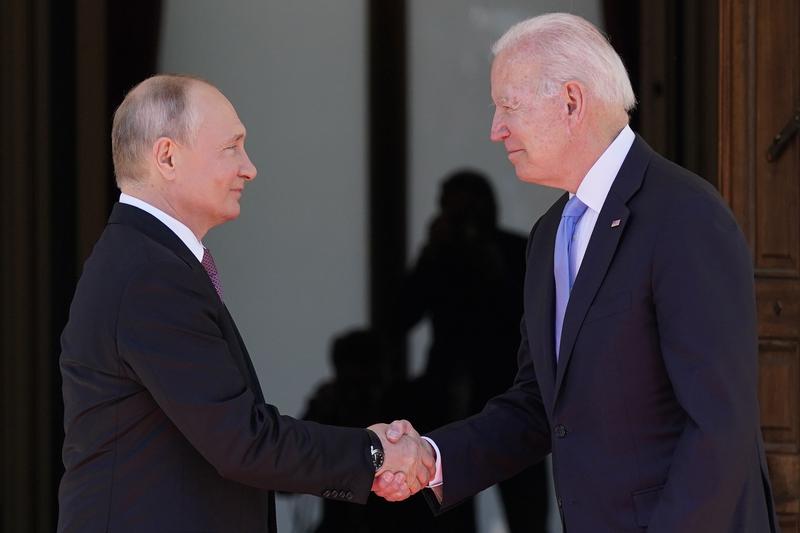Melissa Harris-Perry: I'm Melissa Harris-Perry and you're listening to The Takeaway. Yesterday, President Joe Biden met with Russian President Vladimir Putin for the first time since Biden took the oath of office. The highly anticipated summit took place in Geneva, where they were expected to discuss a number of issues, including cyber-attacks, human rights abuses, and the exchange of foreign prisoners. According to both presidents, the two adversarial nations had an amicable and constructive summit, although it's not totally clear whether any progress was made during these talks.
President Joe Biden: Human rights is going to always be on the table, I told him. It's not about just going after Russia when they violate human rights. It's about who we are.
Speaker 1: We sympathize with what happened in the United States, but we have no desire to allow the same thing to happen in our country.
Melissa Harris-Perry: Joining us now to help us understand what exactly happened during this meeting is Anita Kumar, White House Correspondent and Associate Editor for Politico. Anita, so great to have you.
Anita Kumar: Thanks for having me.
Melissa Harris-Perry: What were the accomplishments? Were there any accomplishments from this relatively brief meeting?
Anita Kumar: We're still going to see what happens, but the two countries did appear to agree to continue to talk on a couple things. They're going to have staff really talk about cyberattacks. President Biden said he told President Putin, "Look, here are these 16 areas where we feel like there should be no cyber-attacks. They should be off-limits." The second thing is arms control. Now, this is something that the two countries had been working on before and had reached some agreements. They want to continue talking about that.
Then I think probably the most immediate thing we'll see is the two ambassadors, the US ambassador to Russia and the Russian ambassador to the US, had left each other's countries. They will return to those countries. That's something we're going to see immediately is that there'll be representation in each of those countries.
Melissa Harris-Perry: Prior to the meeting, this was being billed as potentially like a prize fight, all this language about how tense it was going to be. It certainly wasn't like they came out best buddies, but did it feel as though maybe there was a decision to thaw any growing new Cold War?
Anita Kumar: Yes, it was really interesting. Both of them came out pretty complimentary. I mean, I was surprised at President Putin's news conference, he actually went out of his way to compliment President Biden as a statesman and someone that he had a cordial relationship with. I wasn't sure we were going to hear that because it appeared before, to me, that he had sort of had more of a cozy relationship with President Trump. President Biden said, "Look, it was a good talk." Definitely, I don't know that this is the beginning of any huge relationship there, but it was very noticeable that they say that they can talk to each other, that it was cordial, that they could continue to talk. That was very noticeable.
Melissa Harris-Perry: Of course, a relationship or warmth with Putin kind of cuts two ways for the American domestic public, right? Putin is always quite strategic. I'm wondering if that relative warmth is a good thing or a bad thing for President Biden as he's looking at these declining numbers with the US population.
Anita Kumar: Before we left on this trip, that was what so many people were talking about, was how is this going to look politically. As you know, President Biden was getting a lot of criticism, primarily from Republicans, before he left that this meeting shouldn't even happen, that President Biden shouldn't "reward" President Putin with a meeting that made it look like the US and Russia were on the same page. Now we're going to see what's going to happen here.
Are people going to say, "Look, it's great that they're having that conversation, they started that," or are they going to say, "Look, they didn't get anything out of it"? We just don't know what President Biden's going to get out of this. As he said yesterday, it really depends on what happens over the next three to six months. Do these things they talk about really turn into anything or not? If they don't, it's going to look like, "Hey, it's another US president who believed what President Putin said and didn't get any deliverables."
Melissa Harris-Perry: We don't know what will happen, but do we know what Biden wants to happen?
Anita Kumar: He wants, at the staff level, his staff and President Putin's staff, to sit down and work on some of these issues that we talked about, and then come back to them and say, "Look, this is what we came up with." He does want some agreement. We just don't have those agreements yet. It's noticeable to me that neither president said, "Hey, look, we're agreeing to meet again, either in Russia or the United States. We're agreeing to meet in a third country." They didn't say that. I don't think there's any plans for them to continue talking. It'll kind of depend on what happens in these coming weeks and months.
Melissa Harris-Perry: Anita Kumar is the White House Correspondent and Associate Editor for Politico. Thank you so much for joining us.
Anita Kumar: Thanks for having me.
Copyright © 2021 New York Public Radio. All rights reserved. Visit our website terms of use at www.wnyc.org for further information.
New York Public Radio transcripts are created on a rush deadline, often by contractors. This text may not be in its final form and may be updated or revised in the future. Accuracy and availability may vary. The authoritative record of New York Public Radio’s programming is the audio record.



